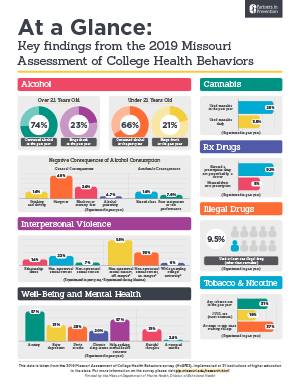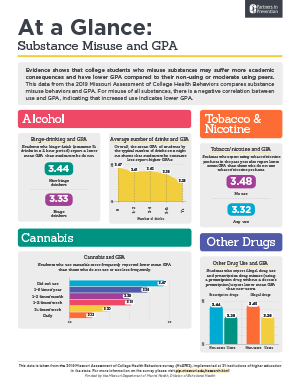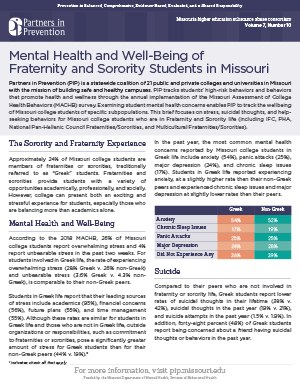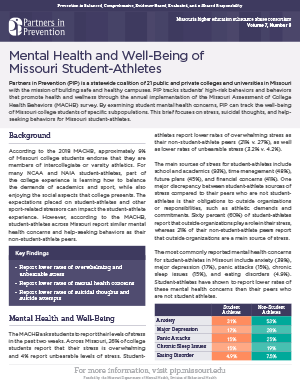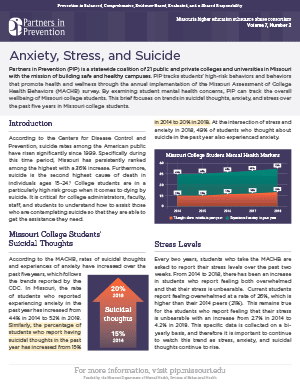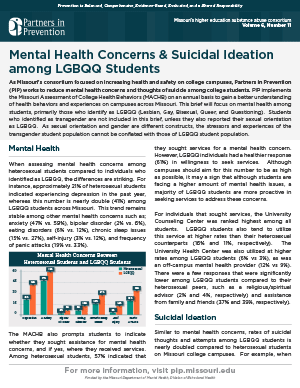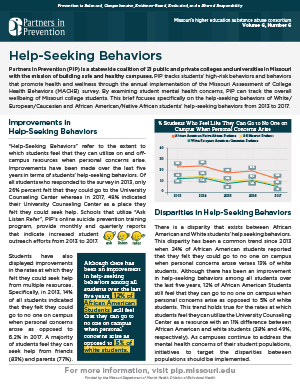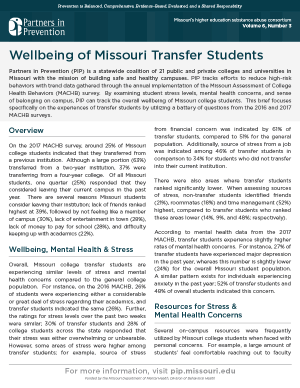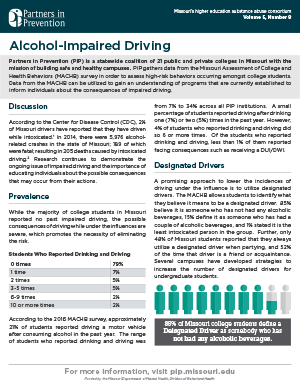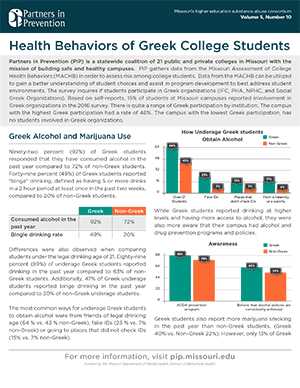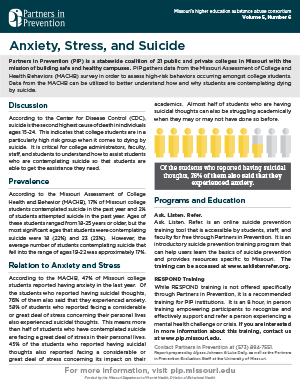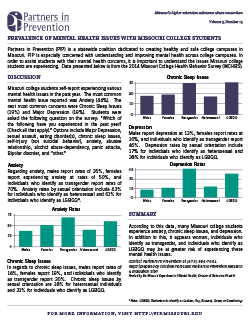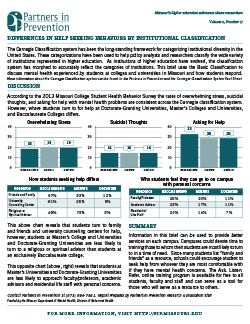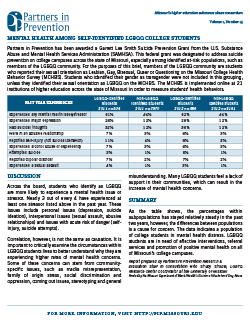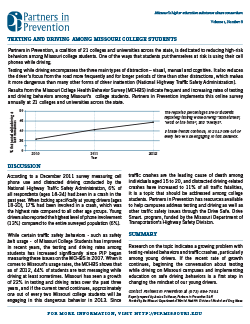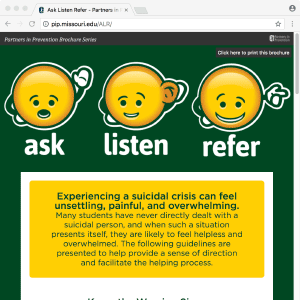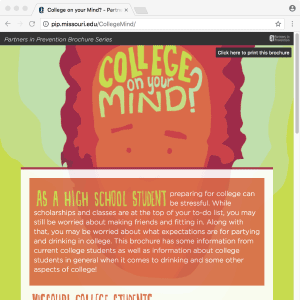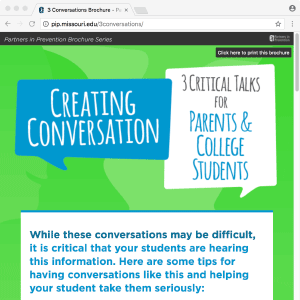
Mental Health

College students’ mental health may be at risk due to the changes in environment and added stresses of college life.
While some stress and anxiety can be beneficial, untreated mental health conditions can produce negative outcomes. Complied here are resources relating to research and best practices for mental health to aid campuses in providing effective mental health support.
Scope
Quick Links
National Data | Missouri Data | Warning Signs | Protective Factors | Population ConsiderationsNational Data
75% of all lifetime mental health conditions begin by age 24
1 in 5 young adults will experience a mental health condition during college.
1 in 5 college students are affected with anxiety and depression, which are the top reasons college students seek counseling.
Suicide is the 2nd leading cause of death among people aged 15-34.
Approximately 1 in 5 adults in the U.S.— 43.8 million, or 18.5% — experiences mental illness in a given year.1
Approximately 1 in 25 adults in the U.S.— 9.8 million, or 4.0% — experiences a serious mental illness in a given year that substantially interferes with or limits one or more major life activities.2
18.1% of adults in the U.S. experienced an anxiety disorder such as posttraumatic stress disorder, obsessive-compulsive disorder and specific phobias.7
Missouri Data
of Missouri college students indicate that they feel stressed
26% feel overwhelmed with stress, and 18% report that stress considerably impacted or interfered with academic life.
The main sources of stress for Missouri college students include school/academics, financial concerns, future pans, and time management. Other sources of stress include jobs, dating/relationship with partners, family, friends, roommates, physical health, organizations/responsibilities/athletics, and mental health issues.
6% of Missouri college students do not feel like they can go to anyone on campus when a personal concern arises. However, most Missouri college students turn to friends/peers both on- and off-campus.
In the past year, 57% of college students in Missouri have experienced anxiety, 31% of have experienced major depression, and 20% have experienced chronic sleep issues.
44% of Missouri college students indicate to have had suicidal thoughts, and 23% of Missouri college students have had suicidal thoughts in the past year.
Warning Signs
If you or someone you know is experiencing any of the following, it could be a sign that you or they could be experiencing mental health issues:
- Excessive worrying or fear
- Feeling excessively sad or low
- Confused thinking or problems concentrating and learning
- Extreme mood changes, including uncontrollable “highs” or feelings of euphoria
- Prolonged or strong feelings of irritability or anger
- Avoiding friends and social activities
- Difficulties understanding or relating to other people
- Changes in sleeping habits or feeling tired and low energy
- Changes in eating habits such as increased hunger or lack of appetite
- Difficulty perceiving reality (delusions or hallucinations, in which a person experiences and senses things that don't exist in objective reality)
- Inability to perceive changes in one’s own feelings, behavior or personality
- Misuse of substances like alcohol or drugs
- Multiple physical ailments without obvious causes (such as headaches, stomach aches, vague and ongoing “aches and pains”)
- Thinking about suicide
- Inability to carry out daily activities or handle daily problems and stress
- An intense fear of weight gain or concern with appearance
Protective Factors
The risk of mental health issues can be lowered by certain protective factors. They include:
- Good coping and problem solving skills
- Having a support system (family, friends, and school)
- Inclusive group norms
- Opportunities to participate in a range of activities
- Physical and psychologically safe environment
- A school environment that encouraged help seeking and promotes health
Population Considerations
- Among African Americans, anxiety is a bigger risk factor than depression or substance misuse.
- The pressures of adjusting to an unfamiliar culture is a risk factor common to many diverse groups, especially recent immigrants, including Asian students and Latinos.
- Mental health struggles, such as post-traumatic stress disorder (PTSD) and substance use, are common risk factors among returning veterans.
- Since members of the LGBTQ+ community often experience higher rates of discrimination, harassment, and victimization, this can increase their rates of major depression, anxiety disorders, and substance use. This also greatly increases their risk factors for suicide.
- Arab-Americans may be exposed to discrimination and acculturative stress, which can be associated with higher suicide risk.
Data Briefs
Click on a brief below for more information.
At a Glance
Volume 7
Volume 6
Volume 5
Volume 5
Volume 3
Volume 2
Volume 1
Best Practices
CCMH—the Center for Collegiate Mental Health at Penn State is a practice-research-network that focuses on providing information on the mental health of today’s college students. CCMH provides annual reports on college students who are receiving mental health services, reporting on trends and best practices based in practice, research, and technology. Learn more at ccmh.psu.edu.
NAMI – the National Alliance on Mental Illness is dedicated to bettering the lives of those affected by mental illness. Nami educates, advocates, listens, and leads on programs, policies, organizations, and practices relating to mental health. Visit nami.org/Find-Support/Teens-Young-Adults/Managing-a-Mental-Health-Condition-in-College to learn more. Managine a Mental Health Condition in College. (NAMI website: nami.org)
NCAA Sport Science Institute— The National Collegiate Athletic Association (NCAA) recognizes that mental health is a major factor in the academic and athletic success and well-being of student-athletes. The NCAA Sport Science Institue partners with mental health organizations to research and educate universities, coaches, and student-athletes on the importance of mental health. The NCAA Sport Science Institute have researched and published documents on student-athlete mental wellness, such as Mental Health Best Practices and Mind, Body, and Sport: Understanding and Supporting Student-Athlete Mental Wellness. Learn more about the Sport Science Institue at ncaa.org/sport-science-institute/mental-health-best-practices.
National Resources
- Ask. Listen. Refer.
- The Trevor Project
- The Jed Foundation
- CDC
- NAMI
- NAMI Helpline (800-950-NAMI; text “NAMI to 741741; info@nami.org)
- SAMHSA
- Center for Collegiate Mental Health at Penn State
- Resource Guide for Mental Health Students & Counselors
